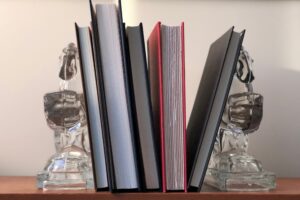When I was in ninth grade, I was teased by some boys that I couldn’t get pregnant because I didn’t have my period. Over a thicket of students, they launched the insult at me while I made my way down the hallway to my next class. It was the first time I’d been body shamed. The first time I used fuck off as a response. Which is worth noting, given that I’d never actually dropped the F-bomb before thanks to my strict Christian upbringing. But the expletive rolled off my tongue like it had been waiting for the perfect occasion, and I walked by those boys with my head held high, undaunted by their crass remarks. On the inside, I burned with embarrassment over the sting of being identified as sexually immature, and that my lack of development was now a topic of conversation amongst my peers. Yes, I was a late bloomer. And, yes, being almost fifteen, the wait for my womanhood had created an anticipation in me almost as big as my mother’s for the second coming. When it finally did arrive, I couldn’t have been more deflated to learn that the mystery of menstruation was no more than an expensive hassle, a maelstrom of hormones, and the final authority on whether or not I could wear white. It wasn’t until my period stopped 36 years later, at the age of 50, that I realized all that I’d lost.
In truth, I took my vagina for granted. That’s what one says when you recognize the importance of something you no longer have, right? All those decades, all those moon cycles (around 500 I figure), without my acknowledging the sheer brilliance of my V. How it can experience such intense pleasure and pain. Renew itself month after month. Endure the trauma and disfigurement of birth and then put itself all back together again. How it is both reliable and surprising. Formidable and fragile. Sensual and utilitarian. Extraordinary to such a degree that humans (and by humans I mean men) have been trying to steal it from women for forever and a day, believing they can somehow possess it. For thirty-six years I failed to appreciate all that my vagina could do. Which is why I fell dumbstruck when my period disappeared, much like it arrived, out of nowhere, ushering me, once again, into a new life stage, indifferent to whether I was ready or not.
It has taken me over a year even to begin to accept the fact that I have gone through “the change.” I always cringed hearing that term growing up thinking it all sounded rather dramatic. Of course, now I know it is bloody dramatic. I’ve never had so many hushed parking lot conversations about one particular subject. Menopause changes nothing and changes absolutely everything. For those who just flinched reading the M word, I’ll write it again. Menopause. And now in caps, MENOPAUSE. It’s not a disease, people. But it can feel like one because it triggers a burst of aging so furious that when it’s over, you’re left standing in the mirror wondering what the hell just happened? What in God’s name just happened to my body, my skin, and, most of all, my vagina?
What I didn’t realize, as I tried to catch my breath from all the change happening, is that menopause had launched me (and by me I mean my ego) into a considerable crisis. Suddenly, I felt and looked old. Or maybe I just looked my age (it’s so hard to know here in L.A.). Either way, while it was once easy to stay ahead of my years, I no longer could. A major organ had signed off and, as a swan song, given the rest of my biological team the thumbs up to go ahead and begin their own steady decline. Things started falling apart as fast as the skin was falling off my face. I found myself avoiding my reflection at all costs. Undressing in the dark. And most of all, making every excuse in the book about why I couldn’t/didn’t want to/wasn’t going to have sex. Why bother trying, I thought? If this ship is going down, I may as well pour myself another glass of Pinot Gris and watch it happen from a comfortable deck chair. Even if it takes another forty years!
It was a cardiac arrhythmia (a common side effect of menopause) that finally forced me to visit a clinic. I arrived at my appointment already impatient, tapping my watch and insisting that all I needed was some low-dose estrogen to calm my stuttering heart. The maybe 28-year-old resident who conducted my intake interview duly noted my concern, but then proceeded to spend the next thirty minutes quizzing me on my vagina. On a scale of 1-10, she inquired about all aspects: intercourse, dryness, pain, libido, frequency, duration. If I answered I don’t know, she insisted on a number, an actual data point. Something quantifiable that could be plugged-in, sorted and manipulated, to provide an overall median norm for all the vaginas of all the other post-menopausal women out there, 52.1 years in age. The formality around something so intimate made me want to crawl up inside of my V rather than participate in analyzing its function. How could this youngster with her plump lips (no pun intended), collagen-rich skin, and superb elasticity, possibly relate to or even empathize with my situation–the newness of it, my embarrassment over it, and profound loss because of it?
When finished, I got a prescription for my lady parts (not my heart), and a warning from the doctor to “use it or lose it.” Other than that, I concluded that my 52-year-old vagina would be something that I manage quietly on my own. That conversations about menopause would continue to take place in parking lots or become muddled-down Q&As with my physician. I told myself that if I would just stop resisting and accept this life stage as being a watered-down version of the past, my crisis would pass. I almost convinced myself, too. But then something completely unexpected happened, like an out-of-nowhere plot point in a great movie. I went to a birthday dinner and got seated beside a sexologist. A post-menopausal sexologist, by the way. And guess what? All we did was talk about middle-age vaginas–minus the panic, the shame, the dispassion, the ageism. We talked about vaginas the way people talk about their glutes or abs or biceps. For thirty minutes we discussed the intricacies of weight lifting to strengthen the vaginal muscle. No, not the Kegels you’re thinking about. Those are for pussies, my friend. I’m talking about contractions with a five-pound dumbbell hanging off your V to help stave off atrophy and keep it healthy and strong. We spoke about the best lubricants and timing them perfectly; how intimacy and sex remain inextricably linked; and how women must return to practicing regular self-care down-there. Remember those days? We discussed our vaginas as being vibrant and luxurious and functional, and not ghostly relics from the past. It was a stimulating (again, no pun intended) conversation. One of the best I’ve had in ages. Because it reminded me to focus and work at staying young, rather than give up and grieve over growing old.
So, here I am. Fifty-two and, once again, in a position to be teased for not being able to get pregnant because I don’t have my period. I think a year ago it would have stung, as it did at 14, to have someone throw that insult my way. I would have felt hurt and embarrassed to be pointed out as different. But now that I have made it to the other side of menopause, acknowledged and appreciated the change that I’ve gone through, I’m okay. I don’t need to drop the F-bomb. Because my vagina rocks. And I will never take it for granted again.







